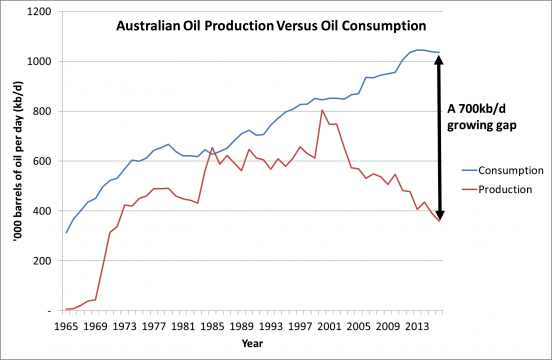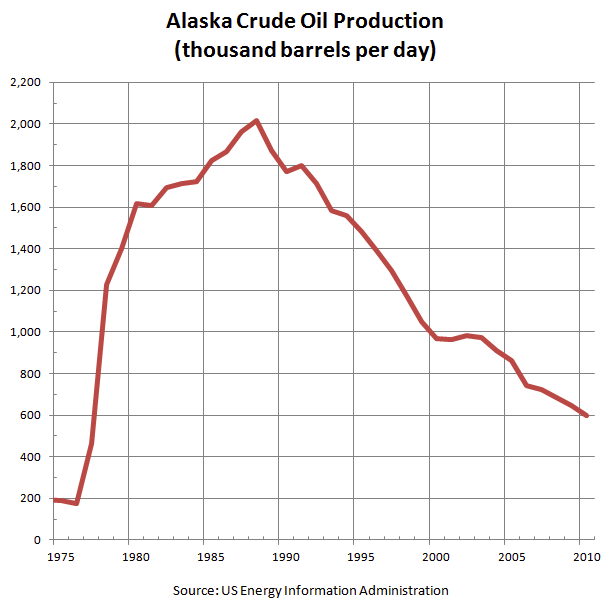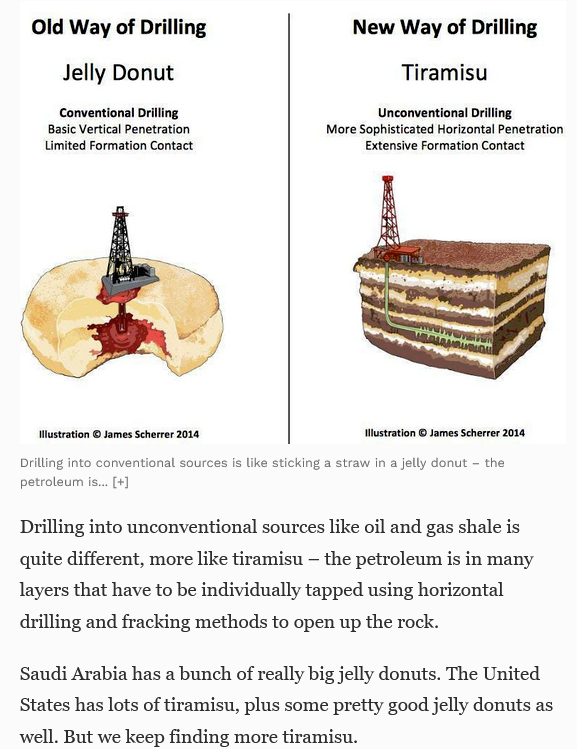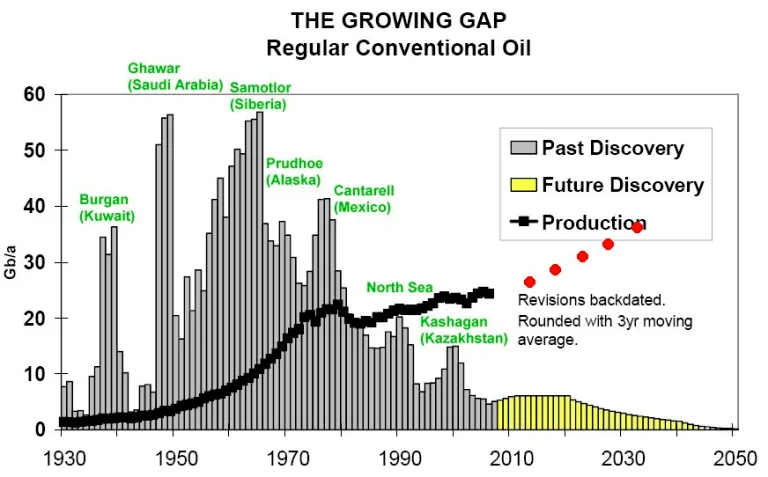Unless my archives are incomplete, here is the first thread by Peak Oil Man, back in Aug 04.
http://dazvoz.com/sssfarchives/topic1226650.shtm
The basic premise by POM and my response to it (here, as Everyone Loves Iago) is basically the crux of the whole argument that continued over the following 6 years or so. New data came in but it really didn’t shift the discussion much.
Here’s a later Peak Oil thread by Russell, from 2010.
http://dazvoz.com/sssfarchives/4805350.shtm
I think the key to the longevity of this meme is that it pairs a statement that is obviously true (that global oil production will one day reach an overall maximum) with statements that are dubious (peak oil will arrive in 1997/2003/2007 and there will be a critical shock when demand exceeds supply that will end modern agriculture and air transport in a short period etc etc).
I’m not going to say it is the daftest idea that ever infected public consciousness but I was a bit surprised at how seriously it was being treated by journalists.
Apart from the illogic of it, the other troublesome aspect is that it pretends a catastrophe would come because of a lack of oil, whereas the real impending catastrophe could come because there’s just too damned much of it.
The two prongs of the wrongness were that a) peak oil was coming very soon (originally 1997 and then delayed in stages to 2007 by British geologist Colin Campbell) and b) that the effects would be sudden and drastic.
Addressing these two separately:
PEAK OIL TIMING The exact timing of peak oil is of course uncertain and because production is variable there are many “local” peaks, and we won’t know which was the actual historical maximum until decades later, probably. Nonetheless, the basis on which Campbell made his estimates was unsound. He began by fitting a bell curve (the Hubbert curve, named for Marion King Hubbert) to the US oil production graph, then using those parameters to fit a curve to global production. The complexity of global trends, the development of new fields, and improvements in technology all suggested to other authors that there was no real reason to think that global production would follow a similar curve. The whole history of oil exploration and production has been one of staged advancements in location and recovery, with old fields being revitalised by developments and new fields coming on line. Even during the period of “Peak Peak Oil Talk”, huge new fields were found and techniques for extracting tight oil were improved. Campbell estimated that we were around 50% of the way through the ultimate recoverable oil on Earth: more mainstream estimates were more like 30%. Some of Campbell’s followers would suggest that Saudi Arabia was vastly overstating its reserves … but why? The Saudis would get better value by understating them, leading to higher prices. Indeed a conspiracy-minded person might suggest that the reason why some people were pushing P.O. theories in order to drive up oil prices.A specific number was often repeated, that oil production would never go over 87 million barrels a day. Even certain Green politicians took up this number.
But time wore on and oil production kept rising. 2019 had the highest production so far, at 95 million barrels a day (average for the year). The decline in 2020 and 2021 was because of a decline in demand because of covid, not because of intrinsic supply limitations.
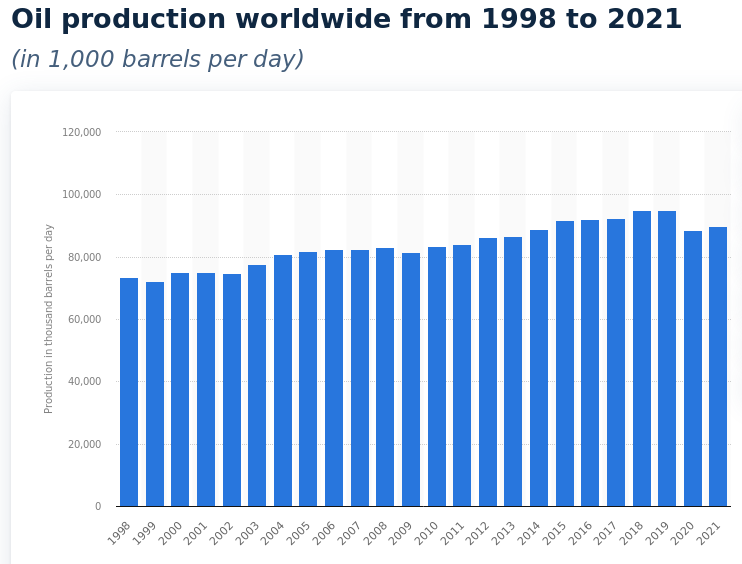
The real nail in the coffin of the Campbell catastrophe was the fact that US oil production came back up, going way past its original peak, meaning that even the original simple model for production in that one country was thrown out. The US is now the world’s biggest oil producing nation.
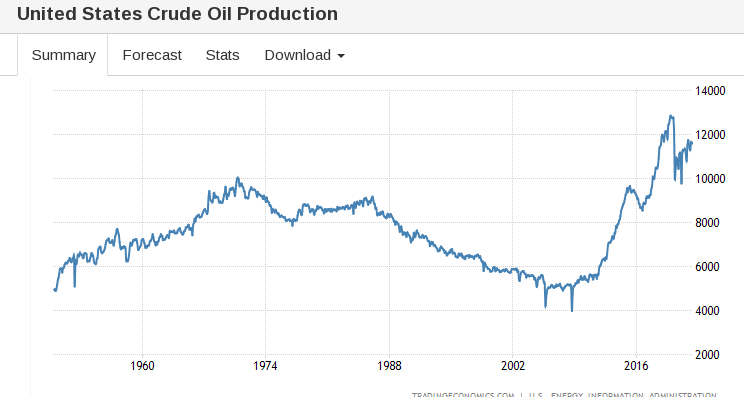
Will 2019 end up being the all-time global peak? It is possible, but I doubt it. In the thread above I suggested that the likely range from 2025 to 2040 and I think that’s still reasonable. The major impacts on oil production in the last few years have been a virus and a war, and I don’t know what the next few years hold obviously. On the other hand the exact year of the peak oil production is not even a particularly important piece of data, it will ultimately just be a piece of statistical trivia as discussed in the next section.
THE IMPORTANCE OF PEAK OIL
There is genuine uncertainty about the remaining oil resources and the rate at which we can extract them and market conditions etc etc so even though Campbell’s (increasingly delayed) estimates of the timing of peak oil were way earlier than the mainstream I can basically accept that they could have been made by a good faith oddball, like Toscanelli and his inaccurate estimates of the Earth’s circumference that led Columbus astray.
I’m not so generous when it comes to Campbell’s apocalyptic vision of the effects of a peak in oil production, which seem to be completely at odds with any reasonable understanding of the economy or technology, or commodities or politics or psychology or anything . He painted a picture of a supply curve and a demand curve that are completely independent, such that one day the latter exceeds the former and all hell breaks loose. He predicted that the increase in oil price before 2010 would curtail mass agriculture and air travel, and fundamentally shift the world to a new economic order in a short span of time.
That’s just not how things have ever worked. For decades there have been people working on new methods of obtaining oil, while other people have been working on alternatives for oil in all capacities. As these methods kick in and become cheaper, as the long term increase in oil price continues, oil becomes less favourable and makes up a lower percentage of energy use … over several decades. The demand is moderated by the price.
There was a year where we reached peak guano: synthetic methods of nitrogen fixation became cheaper and more convenient and played an increasing role in fertiliser production. No one gives a shit about the year that peak guano production was reached. People didn’t one day find the guano cupboard was bare and say “I guess I’ll die.”
There have been historic spikes in oil prices (in 1973, in 2008) but they were driven by transitory political and financial conditions. When Campbell’s “The Coming Oil Crisis” came out in 2004, oil was at 50 USD/barrel: that would be 80 USD/barrel allowing for general inflation. Today it is 94 USD/barrel when we are in something of an oil shock because of war-related supply disruption. A year ago it was 62 USD/barrel. Point being: the price goes up and down due to various short term factors but if you look at the smoothed graph there’s been no increase since he published that book above and beyond general inflation.
I think that sensational aspect of Campbell’s work was either dishonest or just plain nuts.
—-
As mentioned above, I think the focus on Campbell’s crankery was unfortunate in that it rather buried the main story: rather than running out of oil, the problem is that if we use all of the oil, it’s going to be hard to live here. The timing of peak oil is probably mainly going to be controlled by political efforts to move away from fossil fuels. If the nations of the world do actually meet their emissions targets then it will probably mean that some 2 trillion barrels of the oil that can feasibly be recovered will remain in the crust in perpetuity.
